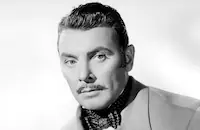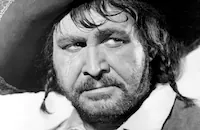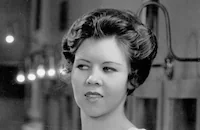God's Country and the Woman

Brief Synopsis
Cast & Crew
William Keighley
George Brent
Beverly Roberts
Barton Maclane
Robert Barrat
Alan Hale
Film Details
Technical Specs

Synopsis
Steve Russett is recalled to Vancouver from his European escapades by his brother Jefferson in order to share the running of Russett Lumber Company. His irresponsible behavior ruins a deal which would have forced Russett competitor Barton Logging Company to pay a large royalty for the right to use the Russett rails. Angered, Jeff flies Steve up to the logging camp, but Steve escapes in a plane which runs out of gas, forcing Steve to land in a lake. After swimming and struggling through the woods, he reaches the Barton camp, where he is surprised to find that the owner, Jo Barton, is a woman. Not knowing his identity, Jo refuses to feed Steve. Meanwhile, Jeff is planning to block Jo's railway line so that she will fail to get her logs through in time to preserve her rights to log Crown Timber lands. Trying to get back to the Russett camp, Steve is mistaken for one of the Barton men and beaten by Russett men. Ole Oleson, one of Jeff's spies, tells Jeff that he saw Steve at the Barton camp and Jeff decides to leave him there. Steve gets a menial job at Barton and falls in love with Jo. Paid agitator Bulkhead tries to scare the Barton workers away by telling them that their supplies will be blockaded. Steve slips away and warns Jo. Arriving at his brother's camp, Steve realizes that Jeff's foreman is about the stop the Barton food supply train. Steve commandeers it, arriving at the Barton camp in time to halt the riot. A grateful Jo then makes Steve boss. When Jo refuses to sell out to Jeff, he reveals Steve's real identity and, thinking that he lied to her, Jo orders him out of camp. Later, risking his life, Steve saves Jo from Jeff's trickery and afterward Steve and Jo are reunited.

Director

William Keighley
Cast

George Brent
Beverly Roberts

Barton Maclane

Robert Barrat

Alan Hale
Joseph King
El Brendel

Joseph Crehan

Addison Richards

Roscoe Ates

Billy Bevan
Bert Roach
Vic Potel

Mary Treen
Herbert Rawlinson
Harry Hayden
Pat Moriarity
Max Wagner

Susan Fleming

Eily Malyon
Shirley Lloyd
Andre Cheron
Georgette Rhodes
Robert Bell

Joan Woodbury
Renee Torres
Minerva Urecal
Charles Sherlock
Don Downen
Lyle Moraine
Hal Craig
Irene Coleman
Saul Gorss
George Ford
Henry Otho
Ed Chandler
Winston Jay

Lee Phelps
George Chandler
Gil Perkins
Harry Burns
Mathilde Comont
Bob Stevenson
Ben Hendricks
Crew
Charles Belden
Wilfrid M. Cline
Allen Davey
Lou Edelman
Leo F. Forbstein
Tony Gaudio
Chuck Hansen
William Jacobs
Natalie Kalmus
Jack Killifer
Peter Milne
Norman Reilly Raine
William V. Skall
Max Steiner
Jack L. Warner
Carl Julius Weyl

Film Details
Technical Specs

Articles
God's Country and the Woman -
By Glenn Erickson

God's Country and the Woman -
Quotes
Trivia
Warner Brothers' first feature-length film in full Technicolor.
Technicolor cinematographer William V. Skall was relegated to the position of photographic advisor when he broke his ankle in a fall.
Bette Davis was to star in the movie, but was suspended when she failed to show up. She refused all of 'Jack L. Warner' 's offers until he agreed to her salary demands and a more open contract.
The following actors were in studio records and/or casting call lists, with their character names, but were not seen in the movie: Eily Malyon (Mrs. Higginbottom), Georgette Rhodes (French Teletype Operator), Robert Bell (French Messenger), Don Downen (Messenger), Eddy Chandler (Logger) and Ben Hendricks Jr..
Notes
New York Times notes that filming took place in Longview, WA. According to Daily Variety, Technicolor cameraman William Skall was replaced when he broke his ankle in a fall. According to Hollywood Reporter, Bette Davis was to star and was suspended when she failed to appear. According to modern sources, Davis was determined to refuse all of Jack Warner's offers until he agreed to a more open contract with the salary she felt she deserved. Other films based on the same source include a 1916 Vitagraph film directed by Rollin S. Sturgeon and starring William Duncan (see AFI Catalog of Feature Films, 1911-20; F1.1631), God's Country and the Law, produced in 1921 by Arrow Film Corp., directed by Sidney Olcott and starring Fred C. Jones (see AFI Catalog of Feature Films 1921-30; F2.2141) and Screen Guild Productions' 1946 film God's Country, starring Buster Keaton and directed by Robert Tansey.















